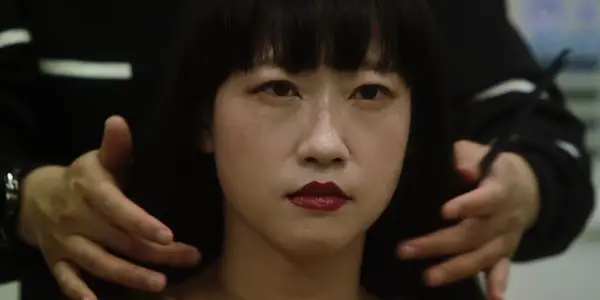MISTRESS DISPELLER: “Marriage Is a Fortress Under Siege”

Payton McCarty-Simas is a freelance writer and artist based in…
It’s a true testament to Elizabeth Lo’s direction that her latest documentary, Mistress Dispeller, doesn’t feel like a work of exploitation or exoticism. This stranger-than-fiction observational portrait of intimacy, set in the Chinese “love industry,” follows four people through the fallout of an affair between Mr. Li, an older man, and Fei Fei, a young colleague whose love he compares to “being in the sun.” That’s not to say that his life with Mrs. Li, his wife of decades, isn’t fulfilling: “With my wife it’s living. It’s a kind of realistic daily life. It’s practical,” he explains. But as the film progresses, we see that this isn’t altogether true, and this is the foundation of the remarkable, yet always shockingly grounded tale of romance and “mistress dispelling”–– the practice of hiring an undercover counselor to guide wayward husbands home–– that unfolds. Mr. and Mrs. Li are an older couple that friends associate with a surprising amount of intimacy in a culture that keeps things close to the vest; they play badminton together almost daily and do each other small favors without being asked; “you even hold hands in the street,” Mrs. Li’s younger brother exclaims. The older woman blushes.
It’s this habitual desire for privacy that creates the need for mistress dispelling in the first place, Lo explained in an interview with the International Documentary Association: If a mistress dispeller “just burst into a family directly and said, ‘I’m a couple’s therapist and I’m going to save your marriage,’ she would be rejected instantly because therapy is still stigmatized across a lot of China and Asia.” The practice, then, is also necessarily based on a breathtaking web of deception that feels antithetical to the very notion of couple’s therapy as it’s traditionally understood. As we quickly see, the mistress dispeller, here a woman called Teacher Wang, is engaging in a monumental amount of (ostensibly) benevolent psychological manipulation, or what she herself describes as “warfare” with the love of the husband as the spoils.
The process, all tracked unobtrusively and with an understated visual elegance by the film crew, is as follows: the wife introduces the husband to the mistress dispeller as a “new friend,” before the mistress dispeller begins instructing her on how to manufacture situations in which the husband will feel vulnerable enough to open up to the mistress dispeller and seek her counsel. Eventually, the same process unfolds again, with the husband introducing the mistress dispeller to the mistress and staging scenarios in which the other woman will feel comfortable discussing, and in successful cases ending, her affair.

The desired outcome, then, is firmly set from the beginning, predicated on a combination of financing and moral convention–– the wife is paying for a mistress dispeller, after all, not to mention that she was “there first”–– a sticky fact that makes the affair itself feel all the more poignant and renders the process especially unfamiliar to an uninitiated audience. Is there anything inherently right in breaking up this particular loving relationship for its predecessor? Teacher Wang’s job is to convince these three people that they’ve come to their own decisions on this question through outright misdirection, a miniature act of social engineering that’s paralleled through repeated references to the pervasiveness of matchmaking services in the country. “Her influence is like a gentle drizzle, soft and soundless,” Fei Fei says at one point of Teacher Wang, a phrase whose delicacy evokes either the light-touch of a good friend or the ominous pervasiveness of a haunting depending on one’s perspective. A motivational speaker puts an eerily fine point on it in an early scene, explaining that while we each believe we control our fate, “the system has already predetermined our hearts.”
This quietly existential ambivalence on the nature of love, balanced with a deep empathy for each character in this particular love triangle on the part of the filmmakers and Teacher Wang alike, makes Mistress Dispeller compulsively watchable without falling into the unsavory conventions of a reality dating show, gliding on ambiguity and finding tenderness and dignity in every aspect. The film foregrounds the ethical conundrums at its center with an opening title explaining that the team secured consent from its participants at the beginning and end of the process (Fei Fei and Mr. Li obviously weren’t aware of the mistress dispeller’s true identity until being shown the film). But this disclaimer–– not to mention all three lovers’ consent to release the film after the deception was revealed–– only makes it more astounding that this extraordinarily sweet portrait, both fresh and primal, was possible to capture at all; and yet there’s still something undeniably haunting about the whole setup. “Women all grow from being like you to being like me,” Mrs. Li tells Fei Fei near the film’s conclusion; “marriage is like a besieged fortress,” another character remarks. Which brings out the subtle question humming underneath the story: Without knights errant like Teacher Wang to shore it up, would the fortress still stand?
Does content like this matter to you?
Become a Member and support film journalism. Unlock access to all of Film Inquiry`s great articles. Join a community of like-minded readers who are passionate about cinema - get access to our private members Network, give back to independent filmmakers, and more.
Payton McCarty-Simas is a freelance writer and artist based in New York City. They grew up in Massachusetts devouring Stephen King novels, Edgar Allan Poe stories, and Scooby Doo on VHS. Payton holds a masters degree in film and media studies from Columbia University and her work focuses on horror film, psychedelia, and the occult in particular. Their first book, One Step Short of Crazy: National Treasure and the Landscape of American Conspiracy Culture, is due for release in November.













